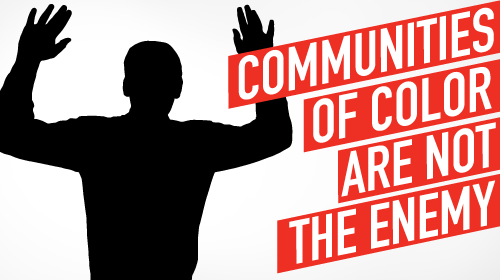The DOJ Ferguson Report Isn’t Just an Indictment of Ferguson Police, but of American Policing Writ Large


What the Justice Department's Civil Rights Division uncovered in Ferguson – racially biased policing on steroids, encouraged by a court system whose budget was dependent on the extortion of its city's residents – isn't just a dark look into an isolated small municipality, it's unfortunately an indictment of American policing in general.
The Justice Department reported on so many injustices in Ferguson that are repeated across the country on a daily basis. From the way law enforcement police communities of color like an occupying army to how the court system sees its policing victims as a way to balance the budget on the backs of its most vulnerable citizens, it is clear that policing in the U.S. is a problem. Earlier in the week, the President's Task Force on 21st Century Policing delivered its interim report to the White House, confirming this national crisis in American law enforcement.
Here are three excerpts from the Ferguson report that are horrifyingly normal to many black and brown people in cities and towns across the United States.
Aggressive, Racially Disproportionate Policing
Patrol assignments and schedules are geared toward aggressive enforcement of Ferguson's municipal code, with insufficient thought given to whether enforcement strategies promote public safety or unnecessarily undermine community trust and cooperation.
– DOJ Ferguson Report, pg. 2
Data … from 2012-2014 shows that African Americans account for 85% of vehicle stops, 90% of citations, and 93% of arrests made by FPD officers, despite comprising only 67% of Ferguson's population.
– DOJ Ferguson Report, pg. 4
The following cities and states across the nation - New York City, Minneapolis, Chicago, North Carolina, Philadelphia, and Boston - have documented accounts of police departments aggressively over-enforcing low-level, nonviolent "offenses" most heavily in communities of color. It is clear that the unequal and unfair treatment of minorities by the Ferguson Police Department isn't just occurring on an isolated bit of U.S. geography. It's a problem from sea to shining sea.
These disparities persist despite the fact that, across the country, whites are more likely to be found with contraband than blacks, as studies consistently show. Indeed, the Justice Department found that while black drivers in Ferguson are more than twice as likely as white drivers to be searched during vehicle stops (even after controlling for non-race based variables such as the reason the vehicle stop was initiated), blacks are found in possession of contraband 26 percent less often than white drivers.
Corrupt Courts
The municipal court does not act as a neutral arbiter of the law or a check on unlawful police conduct. Instead, the court primarily uses its judicial authority as the means to compel the payment of fines and fees that advance the City's financial interests.
– DOJ Ferguson Report, pg. 3
The Justice Department also found that the courts in Ferguson target lower classes to pay fines that further the city's financial interests. Unsurprisingly, this places a disproportionate economic burden on communities of color.
This problem is not unique to Ferguson. As the ACLU documented in our report on debtors prisons, courts across the country illegally imprison people — who may be homeless, unemployed, or simply too poor to pay – simply for failing to pay legal debts. These debts are too frequently incurred because of the selective enforcement of minor offenses. And by selective enforcement, I mean selectively enforcing these laws based on someone's race or their socioeconomic status.
The ACLU just filed a lawsuit in federal court challenging debt collection practices in DeKalb County, Georgia, that result in the jailing of people simply because they are poor. The plaintiff in our case is Kevin Thompson, a black teenager jailed because he could not afford to pay court fines and probation company fees stemming from a routine traffic ticket. Similar to the revenue-generating apparatus in Ferguson, DeKalb County and for-profit Judicial Correction Services Inc. engage in a coercive debt collection scheme that focuses on making money at the expense of protecting poor people's constitutional rights.
Racist Use of Force
Nearly 90% of documented force used by FPD officers was used against African Americans.
– DOJ Ferguson Report, pg. 5
As we have seen most dramatically in the slew of tragic police killings of unarmed African-Americans, from Michael Brown to Eric Garner, John Crawford to Levar Jones, Dontre Hamilton to Ezell Ford, excessive, at times fatal, police force harms the black community disproportionately.
Having documented problems in Ferguson that reflect "deeply entrenched practices and priorities that are incompatible with lawful and effective policing and that damage community trust," the Justice Department offers numerous recommendations regarding police and court practices to correct constitutional violations and repair the city's relationship with the community.
But it is not just Ferguson that must heed these reforms.
Cities and counties across the country which suffer from similar injustices must pay close attention as well if we as a country are to end the rampant racial profiling, selective enforcement, and revenue-over-people practices that permeate every corner of this country's criminal justice system.
Learn more about police militarization and other civil liberty issues: Sign up for breaking news alerts,follow us on Twitter, and like us on Facebook.

